

7 Essential Tips for Support Pets ESA Success
by Lena Park
Last updated: July 6, 2025
Verified and Approved by:
Angela Morris,
MSW, LCSW
Fact Checked

Overview
This article highlights essential tips for ensuring the success of Emotional Support Animals (ESAs) in providing vital mental health support. It begins by recognizing the emotional challenges individuals face, acknowledging that navigating mental health issues can be incredibly difficult. In this context, obtaining a legitimate ESA letter is crucial, as it not only affirms the need for support but also empowers individuals by clarifying their legal rights.
Understanding these rights can significantly ease the burden of anxiety and uncertainty, allowing individuals to focus on their healing journey. Moreover, the therapeutic benefits of ESAs are profound. These animals offer companionship, comfort, and unconditional love, which can be transformative in alleviating mental health challenges. Proper training and awareness are essential, as they enhance the effectiveness of ESAs, ensuring they can provide the best possible support.
As you reflect on your own experiences, consider how an ESA might positively impact your life. Remember, you are not alone in this journey; support is available, and the right ESA can make a meaningful difference in your mental well-being. With the right resources and understanding, you can embrace the healing power of these remarkable companions.
Introduction
In a world where mental health challenges are increasingly recognized, many individuals face emotional struggles that can feel overwhelming. The role of Emotional Support Animals (ESAs) has gained significant importance, offering not just comfort but also therapeutic benefits that can alleviate anxiety and depression, ultimately enhancing overall well-being. As the need for ESAs rises, navigating the process of obtaining the necessary documentation and understanding the legal distinctions between ESAs and service animals can be daunting.
This article seeks to provide clarity and support. It delves into the streamlined services offered by Wellness Wag, the rights of ESA owners, and the essential steps to secure an ESA letter. By addressing common misconceptions and highlighting the importance of pet insurance, we aim to empower individuals to advocate for their needs. Through understanding these critical aspects, you can harness the full potential of your emotional support companion, fostering a nurturing bond that can truly make a difference in your life.
Wellness Wag: Streamlined ESA Letter Services for Quick Approval
Navigating mental health challenges can be overwhelming, and many individuals find themselves in need of support. Wellness Wag offers a user-friendly platform for obtaining Emotional Support Animal (ESA) letters, ensuring rapid approval through a streamlined process designed to support pets esa and alleviate some of that burden. Clients begin their journey with a brief assessment to determine eligibility, followed by a compassionate consultation with licensed medical professionals who genuinely evaluate their needs. Once approved, clients receive their official ESA letter within 24 hours, with approximately 90% of clients experiencing this swift turnaround. This timely support, including support pets esa, can be a lifeline for those facing housing restrictions or travel challenges due to their mental health conditions.
Linda S., a satisfied client, shares, “Applying for an ESA through Wellness Wag was the best decision I made. It was an effortless process and the team was very professional.” Her experience highlights the exceptional service and quick approval that Wellness Wag provides, reinforcing the idea that help is just a step away.
Bonie Berg, a practicing social worker, emphasizes, “With a profound affection for creatures and years of experience in mental health, I am dedicated to assisting clients in utilizing the therapeutic advantages of emotional support animals.” Her commitment to the restorative abilities of these animals reflects the deep connections they can foster.
It is also vital for clients to comprehend the legal distinctions between emotional support animals and service animals, as this awareness empowers them to assert their rights as support pets esa owners. With over 50,000 patients served and a money-back guarantee, Wellness Wag has established itself as a trusted partner in the realm of emotional support services, demonstrating a commitment to efficiency and client satisfaction, as well as the ability to support pets esa. You are not alone; support is available, and Wellness Wag is here to help you on your journey.
Service Animals vs. Emotional Support Animals: Key Legal Differences
Assistance creatures are specially trained to perform tasks that aid individuals with disabilities, enjoying distinct legal protections under the Americans with Disabilities Act (ADA). However, support pets ESA provide comfort and companionship without performing specific tasks. It’s important to note that the ADA recognizes only dogs as service creatures, while emotional support options can encompass any domesticated species. This distinction is vital for ESA guardians, particularly regarding their rights in housing and travel situations with support pets ESA.
Legal protections for service creatures are robust, ensuring that handlers—who must be individuals with disabilities—can access public spaces without discrimination. In contrast, support pets ESA do not enjoy the same level of access under the ADA, which can lead to confusion among pet owners seeking emotional assistance. In housing scenarios, the Fair Housing Act offers certain protections for support pets ESA, allowing individuals to request reasonable accommodations in pet-restricted environments. This legal framework is essential for those who rely on support pets ESA to navigate mental health challenges.
Recent statistics reveal that understanding these legal distinctions can significantly influence the ability of support pets ESA holders to manage housing and travel restrictions effectively. For instance, Wellness Wag provides flexible payment options for their services starting at just $32.25, enhancing accessibility for individuals seeking ESA letters.
As cultural attitudes and financial resources vary across regions, the prevalence and acceptance of service animals and emotional support animals can differ significantly. This variability underscores the importance of being informed about current legal definitions and protections, empowering guardians of support pets ESA to advocate for their rights effectively.
Moreover, research by Beetz et al. (2012) emphasizes that environmental stressors can enhance physical health by lowering blood pressure and heart rate, highlighting their importance for mental well-being. Service dogs undergo rigorous training through specialized programs to perform tasks directly related to their handler’s disabilities, which is crucial for understanding their role and the legal protections they receive.
While individuals can train their own service dogs or engage professional trainers, obtaining certification or documentation from recognized organizations can bolster credibility and ensure that the service dog meets specific standards. It is essential to recognize that the laws protect the service dog teams, not just the service dog itself. Handlers must be the disabled individual, further clarifying the legal responsibilities and rights of ESA owners.
How to Obtain an ESA Letter: Step-by-Step Guide
Navigating the journey of mental health can be challenging, and many individuals find themselves in need of additional support. One compassionate solution is obtaining a letter for support pets ESA. To begin this process, consider these steps:
- Consult a Licensed Mental Health Professional (LMHP): Schedule an appointment to discuss your mental health needs and explore the potential benefits of having an ESA. This initial consultation is crucial, as it lays the groundwork for your eligibility and provides a safe space to share your feelings.
- Complete an Evaluation: The LMHP will conduct a thorough assessment of your situation, determining whether an ESA is appropriate for your emotional support. This step is vital, as it ensures that your unique needs, such as support pets ESA, are understood and addressed.
- Receive Your ESA Letter: If approved, the LMHP will issue a letter on official letterhead, confirming your need for an ESA. It’s important that this letter includes the date, your diagnosis, and the LMHP’s contact information, as these details are essential for validation.
- Present Your Letter: With your ESA letter in hand, you can advocate for your rights in housing and travel situations. As the importance of support pets ESA in mental health becomes increasingly recognized, having this documentation can significantly ease access to pet-friendly accommodations and travel options.
You might wonder about the costs involved. The average expense of obtaining an ESA letter from licensed professionals can vary, typically ranging from $100 to $200. In contrast, training service dogs can cost between $10,000 and $30,000, highlighting the financial aspect of support services for pets. As demand for support pets ESA continues to rise, understanding these steps empowers you to secure the support you need. As one Longmont resident noted, ‘She’s helped me feel more grounded and less anxious.’ This speaks volumes about the positive impact that support pets ESA can have on emotional well-being.
Additionally, Wellness Wag offers a streamlined online platform for obtaining ESA letters, ensuring a hassle-free experience. Telehealth services have further simplified the process, allowing individuals to acquire the necessary documentation without in-person visits. This accessibility aligns with the growing trend of remote consultations, making it easier for those in need to receive the support they deserve.
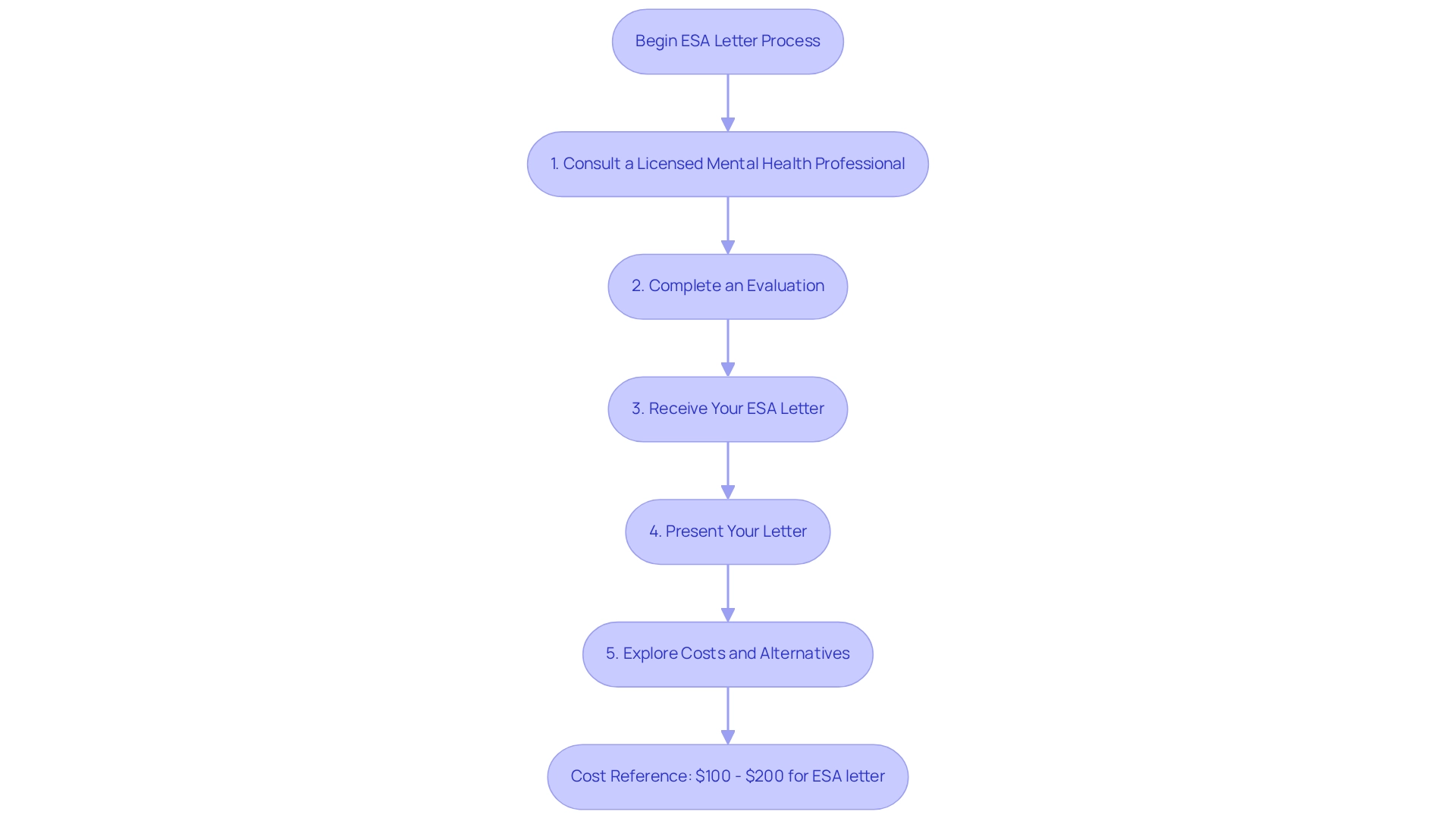
Therapeutic Benefits of Emotional Support Animals for Mental Health
Emotional Support Animals (ESAs) offer a multitude of therapeutic benefits, playing a significant role in enhancing mental health by alleviating anxiety, reducing depression, and promoting overall emotional well-being. Many individuals with emotional support animals report a significant decrease in anxiety levels; in fact, studies indicate that 60% of these individuals experience improved mental health outcomes. The mere presence of an ESA nurtures feelings of companionship, often leading to increased social interactions and diminished feelings of isolation.
For those grappling with PTSD or ongoing mental health challenges, emotional support animals provide essential comfort and stability, aiding in the management of symptoms. A recent survey highlighted that caregivers of dogs and cats reported a more positive impact on their mental health compared to those caring for other types of pets, emphasizing the unique emotional benefits these animals can offer. Moreover, research has shown that the therapeutic presence of these support animals can lead to a remarkable 50% reduction in depressive symptoms among their owners, underscoring their vital role in mental health support.
As mental wellness continues to be a crucial topic in national discussions, the importance of emotional support animals is expected to grow. Their capacity to provide emotional support and companionship renders them invaluable for individuals facing mental health difficulties, reinforcing the necessity for support pets ESA services that are accessible and legitimate. According to Wellness Wag, regulations for support pets ESA vary and can differ by airline, state, and housing authorities, but generally, they require some form of documentation or a letter from a licensed healthcare professional. This underscores the importance of understanding the legal requirements surrounding emotional support animals, particularly for those contemplating acquiring an ESA letter.
Furthermore, it’s noteworthy that 47% of surveyed ESA caretakers identify as male, highlighting the diverse demographics benefiting from these therapeutic companions. Overall, the increasing acknowledgment of ESAs in mental health dialogues emphasizes their relevance and the urgent need for comprehensive mental health education and advocacy.
The Importance of Pet Insurance for ESA Owners
Why is pet insurance vital for ESA caregivers?
Pet insurance holds significant importance for caregivers of support pets ESA, as it alleviates the burden of unforeseen veterinary costs, ensuring that these cherished animals remain healthy and well-cared for. With average veterinary expenses for ESA guardians without insurance often exceeding hundreds of dollars per visit, the financial strain can feel overwhelming. In fact, 47% of pet guardians have faced pet-related debt, and 42% struggle to manage unexpected veterinary expenses, which can range from $800 to $1500 for emergencies.
How does pet insurance ease financial pressure?
Many insurance plans provide coverage for accidents, illnesses, and routine care, significantly reducing the financial strain on caretakers. A study revealed that 23% of dog caregivers identified health issues as their greatest challenge, which can lead to substantial financial stress for those who support pets ESA and rely on their pets for emotional support.
What are the benefits of investing in pet insurance?
Investing in pet insurance empowers caretakers to focus on the emotional support pets ESA provide, alleviating the anxiety surrounding potential medical costs while ensuring they can support pets ESA effectively. Recent trends show a growing awareness of the benefits of pet insurance, with many caretakers recognizing that it not only safeguards their pets but also enhances their own peace of mind.
Are there alternatives to traditional pet insurance?
Alternatives to traditional pet insurance, such as employer-sponsored insurance and veterinary credit cards, provide flexible options for those concerned about high premiums. These alternatives enable ESA caretakers to manage veterinary costs effectively without the long-term commitment associated with traditional insurance.
Why do veterinarians advocate for pet insurance?
Veterinarians consistently advocate for pet insurance, noting that it can lead to improved health outcomes for pets, as caretakers are more inclined to seek necessary medical care without the fear of incurring prohibitive costs.
What should ESA caretakers consider?
As the landscape of pet insurance evolves, it remains an essential consideration for caretakers of support pets ESA, ensuring that their companions receive the best possible care while also supporting the caretakers’ emotional well-being. Therefore, ESA guardians should thoughtfully contemplate investing in pet insurance to protect their pets’ health and their own financial stability.
Rights of ESA Owners: Navigating Housing Regulations
Holders of Emotional Support Animals (ESAs) face unique challenges, particularly in securing housing for support pets esa. Under the Fair Housing Act (FHA), they are granted specific rights designed to protect against discrimination due to disability. This vital legislation ensures that landlords cannot deny housing to tenants with valid ESA letters, which helps to support pets esa, even in properties that enforce no-pet policies. Moreover, support pets esa enable holders to be relieved from paying pet fees or deposits, which can significantly ease the financial pressures associated with finding suitable housing. For those navigating these regulations, it is crucial to present ESA letters during the housing application process and to be well-versed in their rights, ensuring compliance with the law.
However, recent statistics reveal that a significant number of landlords may not fully adhere to FHA regulations regarding ESAs. This underscores the importance of awareness among ESA holders. It’s important to note that buildings with four or fewer units may be exempt from FHA regulations, which can impact the rights of ESA owners in certain situations. In instances of discrimination, tenants have the option to seek legal advice or representation, reinforcing their rights under the FHA. Real-world examples illustrate how ESA caretakers have successfully navigated housing regulations, advocating for their rights and securing accommodations that support pets esa and their mental health needs.
As the landscape of housing regulations continues to evolve, staying informed about recent changes is essential. Ongoing discussions by organizations like the National Fair Housing Alliance emphasize the need for stronger protections for individuals with disabilities, including those who rely on support pets esa. “It is imperative that this data and these recommendations move us to action, in an effort to build a more equitable world, where fair housing is not only a right, but a reality,” states the National Fair Housing Alliance. By understanding their rights and the legal framework surrounding housing for support pets esa, individuals can better advocate for themselves and ensure access to safe, supportive living environments.
Furthermore, studies indicate that emotional support animals can significantly enhance mental well-being by alleviating symptoms of various psychological issues and improving physical health. These animals provide essential emotional support, helping individuals strengthen their resilience and manage daily activities. By remaining proactive and informed, ESA owners can navigate housing regulations more effectively, ensuring they receive the support they deserve.
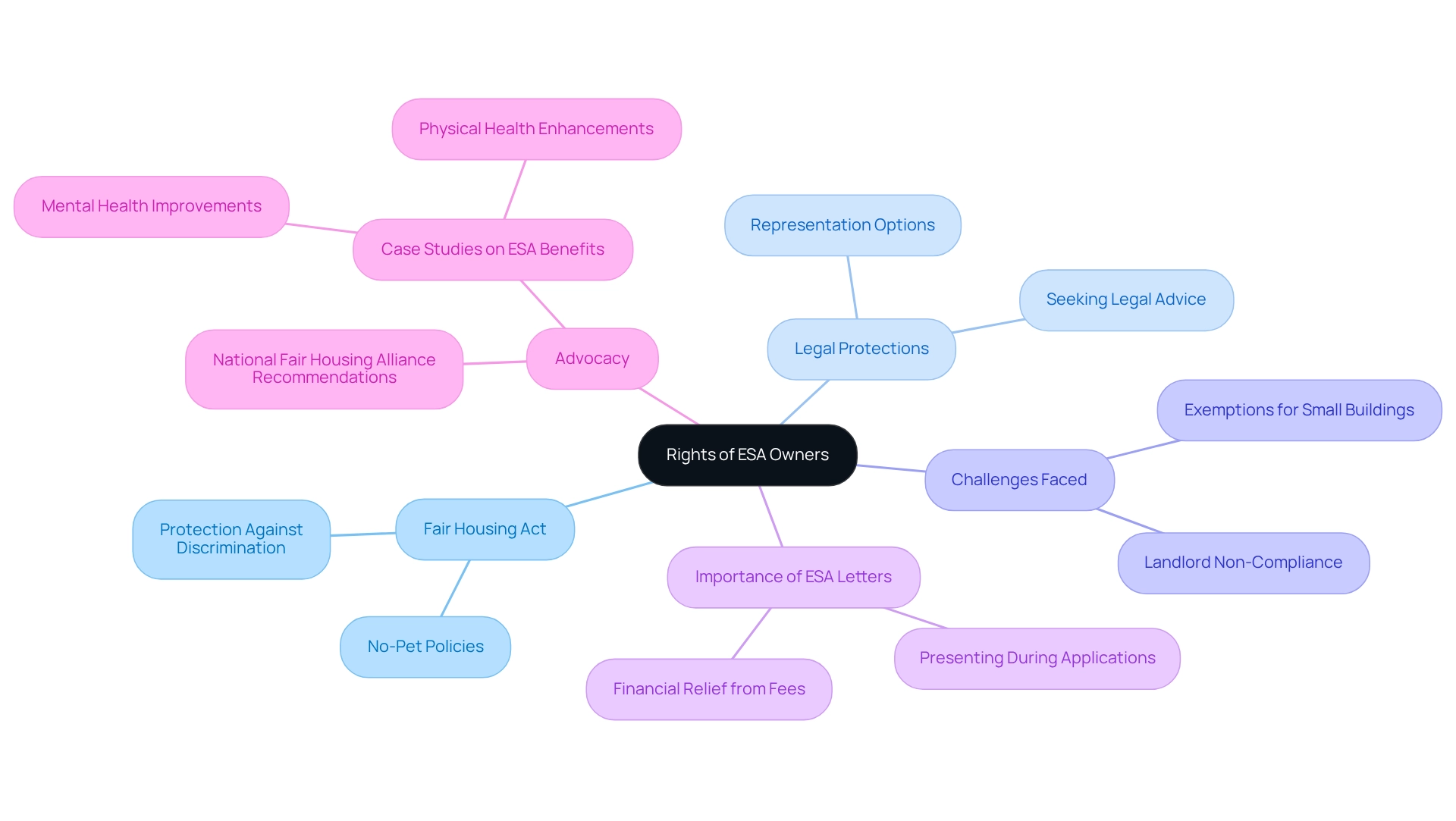
Emotional Support Animals in the Workplace: What You Need to Know
While employers are not legally required to allow emotional support animals in the workplace, many organizations recognize the profound benefits of supporting employees seeking such assistance. It’s crucial for employees to communicate their needs clearly; providing documentation from a licensed mental health professional can substantiate their request. By setting thoughtful guidelines, employers can help maintain a harmonious work environment, ensuring that emotional support animals are well-mannered and do not disrupt operations.
Research reveals a significant connection between ESA ownership and improvements in mental health. Studies indicate that these beloved companions can alleviate symptoms of anxiety and depression, thereby enhancing overall employee well-being. In fact, many employees have expressed a desire for emotional support animals at work, reflecting a growing trend in workplace accommodations. Recent statistics show that approximately 30% of employees have sought ESA support in their workplace settings, highlighting the increasing recognition of their benefits.
To nurture a supportive atmosphere, employers can implement specific policies regarding emotional support animals, such as:
- Designating areas for them
- Offering training sessions for staff on how to engage with these animals
This proactive approach not only fosters inclusivity but also enhances productivity, as employees feel more secure and supported. As HR experts emphasize, incorporating emotional support animals into the workplace can lead to a more engaged workforce. With the right guidelines in place, companies can effectively support emotional support animals, ultimately cultivating a healthier and more productive work environment.
Moreover, as Jori Hamilton highlights, certification and communication are vital in promoting emotional support animals, ensuring that employees can navigate the process effectively. Findings from the case study titled “Correlation Between ESA Ownership and Mental Health Improvement” suggest a strong link between owning an ESA and improvements in mental, emotional, and physical health, particularly for individuals with mental or emotional disabilities. This evidence underscores the importance of emotional support animals in enhancing workplace well-being. Additionally, a recent quote from HABRI states that 90% of people who adopted dogs and 87% of those who adopted cats during the pandemic still have their pets, illustrating the lasting impact of pet ownership on mental health.
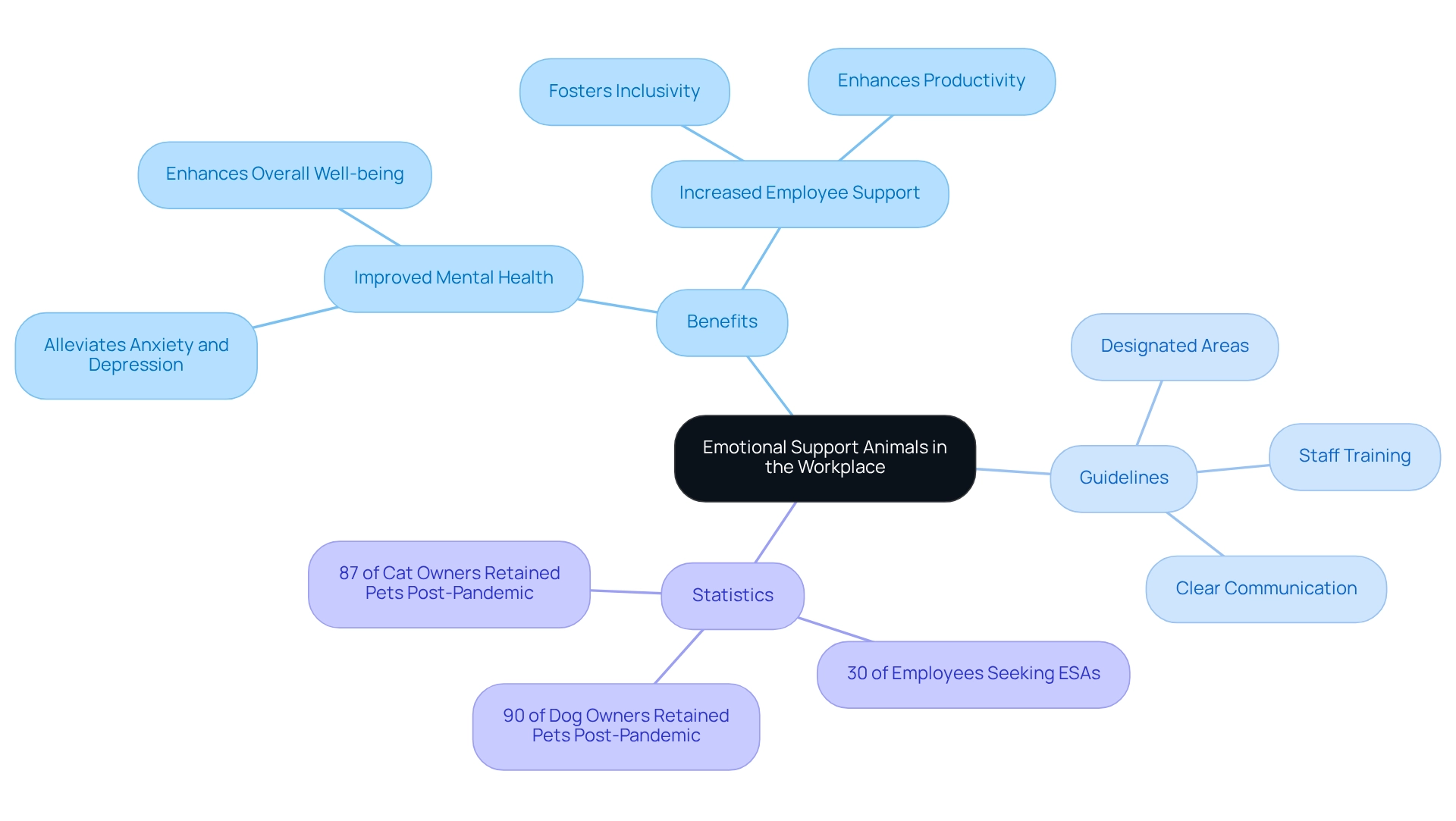
Common Misconceptions About Emotional Support Animals
Common Misconceptions About Emotional Support Animals
Misconceptions about emotional support animals (ESAs) are widespread, particularly the belief that they function similarly to service animals or that they require specialized training. Unlike service animals, which are trained to perform specific tasks for individuals with disabilities, emotional support animals mainly offer comfort and companionship without needing to undertake designated actions. This distinction is essential, as emotional support animals do not possess the same public access privileges as service animals. Furthermore, while there is no formal certification or registration process for emotional support animals, obtaining a valid letter from a licensed mental health professional is crucial for securing housing and travel accommodations.
As concerns about mental and behavioral health rise, more Americans report increased anxiety and high stress each year. Many people confuse service animals with emotional support animals, leading to misunderstandings about their roles and rights. For instance, a recent survey indicated that nearly 60% of respondents could not accurately differentiate between the two. This confusion highlights the importance of educating both ESA owners and the general public about support pets ESA and the differences involved.
Moreover, doubts about the authenticity of acquiring ESA letters online often fuel misconceptions about emotional support animals. However, collaborating with licensed mental health practitioners ensures that individuals receive proper evaluation and documentation, which helps support pets ESA and dispels the myth that legitimate ESA letters cannot be acquired through verified platforms. As Wellness Wag states, “The job of an ESA is to provide comfort and companionship to a person who is suffering from an emotional or psychiatric disability.” Client testimonials emphasize the ease and support provided by Wellness Wag, with many expressing satisfaction with the straightforward process of obtaining their ESA letters. For example, James B. shared, “I had a great experience with Wellness Wag. The approval process for my ESA was easy and hassle-free. Five stars from me!”
By clarifying these misconceptions, we can foster a better understanding of the crucial role emotional support animals play in assisting individuals with emotional and psychological challenges. The rising popularity of therapy dog programs in schools, which assist over 2,100 students weekly in Australia, further underscores the growing acknowledgment of the significance of pet companionship in various environments.
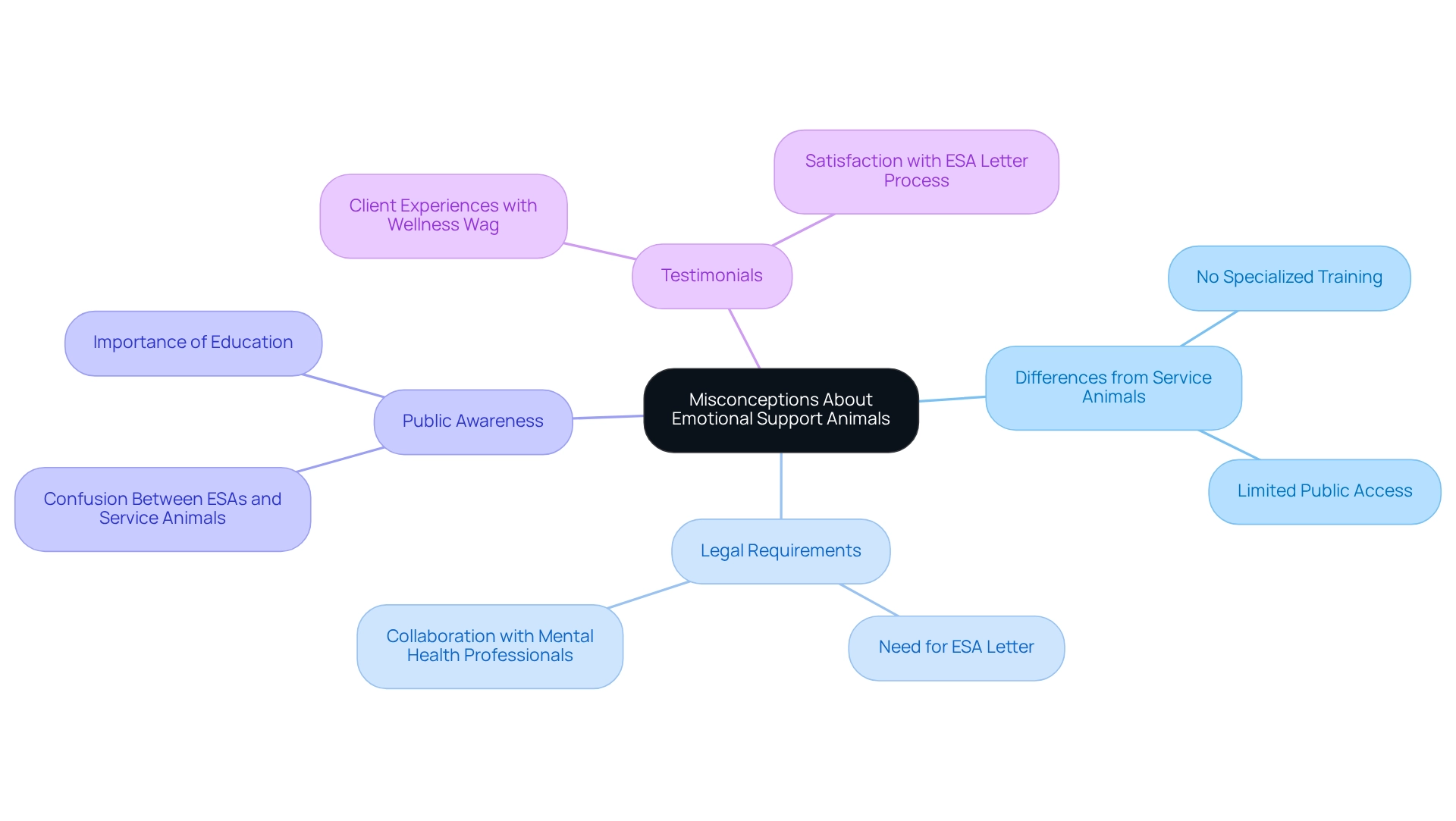
Training Requirements for Emotional Support Animals
While emotional support creatures may not be bound by specific training standards mandated by law, ensuring they are well-mannered and socialized is essential for their effectiveness in both public and private settings. Basic obedience training is highly recommended, as it prepares emotional support animals to respond appropriately to commands and behave well in various situations. This training not only nurtures a deeper bond between the owner and the pet but also enhances the therapeutic benefits of companionship, especially for individuals with disabilities, including seniors who may rely on emotional support animals.
Research indicates that a significant percentage of ESA owners—approximately 70%—provide their companions with basic obedience training. This foundational training is crucial for maintaining a calm and controlled environment, particularly in public spaces where disruptions can occur. Moreover, socialization plays a vital role in an ESA’s development. Trainers emphasize that exposing emotional support animals to diverse environments, people, and other animals helps them adapt and respond positively to various stimuli, which is particularly important for seniors who may have differing social needs.
For instance, the Cavalier King Charles Spaniel is often recognized as an excellent emotional support dog due to its sweet temperament and trainability. According to Dr. Robert Clendenin, “Golden Retrievers, Labradors, Poodles, and Cavalier King Charles Spaniels are top choices for emotional support due to their affectionate and calm nature.” These dogs thrive on social interaction and are quick learners, making them ideal companions for individuals in need of emotional support, including elderly individuals who benefit greatly from companionship. Their ability to connect with their owners enhances the overall effectiveness of their role as emotional support animals.
In 2025, the importance of obedience training for emotional support animals continues to be highlighted by specialists, who advocate for organized training programs that encompass basic commands and socialization activities. Such training not only prepares ESAs for their supportive roles but also ensures they can navigate various environments without causing disruptions. By investing in proper training, ESA owners can significantly enhance the behavior of their support pets and the overall experience of companionship, thereby promoting mental health and well-being for seniors and others who depend on these invaluable companions.
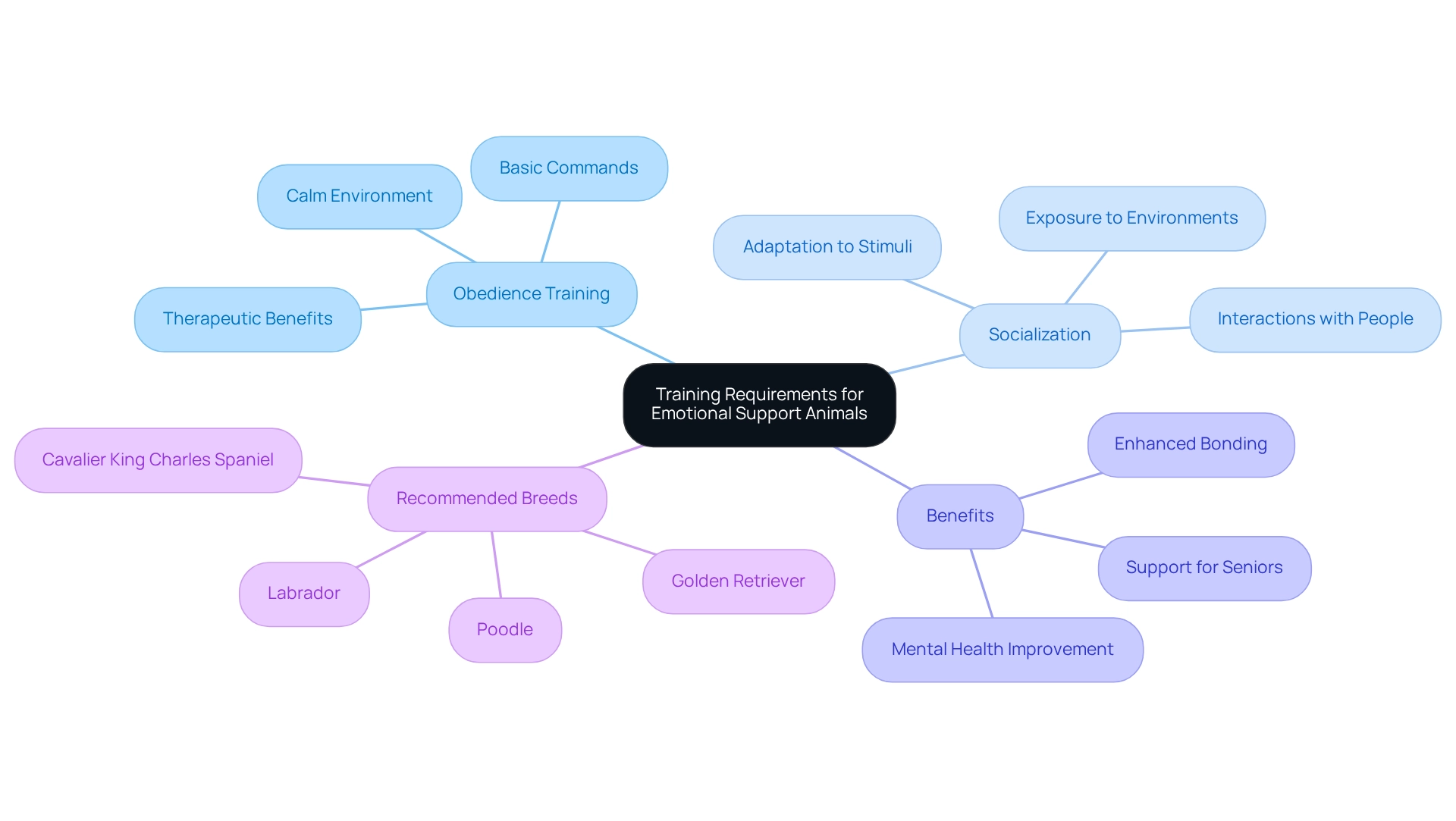
Resources for Further Information on Emotional Support Animals
For those navigating the complexities of mental health, understanding how to support pets ESA can be a crucial step toward healing. Here are some valuable resources to guide you on this journey:
- National Service Animal Registry: This organization offers essential guidance on ESA registration and the rights associated with having an emotional support animal, helping you feel empowered in your choices.
- American Psychological Association: Dive into a wealth of research and articles that detail the mental health benefits of ESAs, reinforcing their significant role in therapeutic settings.
- Fair Housing Act Resources: It’s important to know your housing rights as an ESA possessor, ensuring you are informed about the protections available under the law, which can alleviate some of the stress associated with finding suitable living arrangements.
- Local Mental Health Organizations: Many of these organizations provide valuable assistance and information on acquiring ESA letters, along with insights into the therapeutic advantages of pet companionship, creating a supportive community around you.
For individuals living with emotional or mental disabilities, acquiring an ESA dog may provide essential housing and travel rights. While there is no legal requirement for service dogs to be certified or registered, obtaining certification can lend credibility and ensure that your service dog meets specific training standards. These dogs enjoy full public access rights under the Americans with Disabilities Act (ADA), allowing them to accompany you in public spaces, including restaurants and stores.
Recent studies reveal that 41% of individuals without an ESA reported a decline in their mental health during the pandemic, compared to only 21% of ESA owners. This highlights the critical role these beloved companions play in enhancing emotional well-being. Ongoing investigation is essential to further enhance the advantages of emotional support animals and strengthen assistance for individuals facing mental health challenges. The growing reliance on support pets ESA and service dogs highlights their importance in mental health care, emphasizing the need to address barriers related to housing and travel regulations. This ensures that individuals can fully benefit from the companionship of their support animals.
Notably, survey data shows a gender distribution of 53% female and 47% male among ESA owners, offering a nuanced understanding of the demographic context surrounding ESA ownership. As one satisfied client, James B., shared, “Thanks to Wellness Wag, I received approval for my ESA quickly and without any difficulties. Their staff is friendly and caring.” This reflects the exceptional service and support provided by Wellness Wag, reinforcing the idea that you are not alone on this journey.
Conclusion
The significance of Emotional Support Animals (ESAs) in improving mental health and overall well-being is profound. Many individuals face emotional challenges that can feel overwhelming. Through supportive services like those provided by Wellness Wag, obtaining ESA letters becomes a streamlined process, allowing individuals to secure the necessary documentation to advocate for their rights in housing and travel situations.
Research has shown that the therapeutic benefits of ESAs can lead to significant improvements in mental health. These animals help alleviate symptoms of anxiety and depression, playing a vital role in the emotional stability of their owners. For ESA owners, considering pet insurance is essential; it offers financial security and peace of mind against unexpected veterinary expenses.
As misconceptions about ESAs continue to circulate, promoting education and awareness about their roles and rights is crucial. By dispelling myths and clarifying the process of obtaining an ESA letter, individuals can better understand the profound impact these animals can have on their lives. With a supportive legal framework and resources available for further information, ESA owners can confidently navigate their journeys, ensuring they and their companions thrive together. Remember, you are not alone in this journey; support is available to help you every step of the way.
Frequently Asked Questions
What is Wellness Wag and what services do they provide?
Wellness Wag is a user-friendly platform that offers Emotional Support Animal (ESA) letters, providing rapid approval through a streamlined process aimed at supporting individuals facing mental health challenges.
How does the process of obtaining an ESA letter through Wellness Wag work?
Clients start with a brief assessment to determine eligibility, followed by a consultation with licensed medical professionals who evaluate their needs. Once approved, clients receive their official ESA letter within 24 hours, with about 90% experiencing this swift turnaround.
What are the main benefits of having an ESA letter?
An ESA letter can help individuals navigate housing restrictions and travel challenges related to their mental health conditions, providing necessary support and companionship.
What distinguishes emotional support animals from service animals?
Emotional support animals provide comfort and companionship without performing specific tasks, while service animals are specially trained to assist individuals with disabilities and enjoy distinct legal protections under the Americans with Disabilities Act (ADA).
What legal protections do emotional support animals have?
Emotional support animals do not have the same level of access under the ADA as service animals, but the Fair Housing Act offers certain protections, allowing individuals to request reasonable accommodations in pet-restricted housing.
What is the cost of obtaining an ESA letter from Wellness Wag?
Wellness Wag offers flexible payment options for their services starting at just $32.25, making it more accessible for individuals seeking ESA letters.
How can clients advocate for their rights regarding support pets ESA?
Understanding the legal distinctions between emotional support animals and service animals empowers clients to assert their rights, particularly in housing and travel situations.
What steps should someone take to obtain an ESA letter?
The steps include consulting a Licensed Mental Health Professional (LMHP), completing an evaluation, receiving the ESA letter if approved, and presenting the letter to advocate for rights in housing and travel.
What are the average costs associated with obtaining an ESA letter compared to training service dogs?
The average cost for an ESA letter from licensed professionals typically ranges from $100 to $200, while training service dogs can cost between $10,000 and $30,000.
How does Wellness Wag ensure a hassle-free experience for clients?
Wellness Wag offers a streamlined online platform for obtaining ESA letters and provides telehealth services, allowing individuals to acquire the necessary documentation without in-person visits.
Certify Your Emotional Support Animal Today

Why You Can Rely on Us?
At Wellness Wag, we believe your pet deserves care rooted in both science and compassion. Each article is carefully researched, written in clear language for pet owners, and then reviewed by qualified professionals to ensure the information is evidence-based, current, and practical for real-life care. Our goal is to help you feel confident in making informed decisions about your pet’s health and well-being.
Reviewed by
Angela Morris, MSW, LCSW
Angela is a licensed clinical social worker with 20 years of experience in patient advocacy and community mental health. She has assisted numerous clients with ESA evaluations and brings a deep understanding of disability accommodations, ensuring that all information is accurate, supportive, and practical.

Written by :
Lena Park
Last Updated :
July 6, 2025












